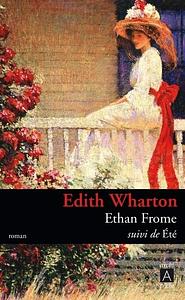Take a photo of a barcode or cover
dark
emotional
sad
tense
medium-paced
Poor Ethan Frome! The guy can’t catch a break! His parents’ illnesses force him to return to his family’s farm. After both of his parents die, he then has to take care of his wife Zeena, who is bedeviled by a number of non-specific ailments. Zeena’s cousin, Mattie Silver, comes to the Frome’s farm to help with the household chores and to take care of Zeena. Mattie is everything Zeena is not—vivacious, lively, and kind to Ethan. Naturally, Ethan falls in love with Mattie.
Ethan Frome, the novella by Edith Wharton, first published in 1911, tells the tale of Ethan’s secret love for Mattie. The setting is the appropriately named Starkfield, and Ethan’s farm on the outskirts of the village itself. Starkfield is a barren place, and Wharton’s evocative descriptions of the weather and landscape are superb. Here’s just one example:
“The cold was less sharp than earlier in the day and a thick fleecy sky threatened snow for the morrow. Here and there a star pricked through, showing behind it a deep well of blue. In an hour or two the moon would push over the ridge behind the farm, burn a gold-edged rent in the clouds, and then be swallowed by them.” (p.57)
Wharton does an excellent job of getting into the mind of Ethan Frome. The book is a testament to Wharton’s skill as an author, as she is able to convincingly portray the feelings and emotions of people so different from herself. Yes, that’s what great authors do, but some do it better than others, and here Wharton does it very well indeed.
One thing that Edith Wharton did have in common with Ethan Frome was an unhappy marriage. Born Edith Newbold Jones in 1862, she married Edward “Teddy” Wharton in 1885. It was quickly evident that their marriage was to be passionless. Teddy suffered greatly from depression, and the marriage ended when Edith divorced him in 1912. Perhaps some of Edith’s own feelings of martial dissatisfaction were channeled into the character of Ethan Frome.
Ethan Frome is often compared to Wharton’s 1917 novel Summer. Both books take place in rural New England, far away from the New York Gilded Age society that Wharton is so famous for portraying. Both novels include vivid descriptions of the natural landscape, and they both highlight the limited options available to their characters. Summer is a more hopeful book than Ethan Frome, but there are definitely similarities between Charity Royall, the main character in Summer, and Mattie Silver. Both young women are essentially orphaned—Mattie’s parents are both dead, while Charity has not seen her parents for many years, although her mother is still alive. Mattie and Charity have had limited educational opportunities, and they have few options available to them in their stories.
The edition of Ethan Frome that I read was the Collier’s paperback from 1987, which featured a ridiculous afterword by noted literary critic Alfred Kazin. First Kazin writes that the book is “an American classic.” (p.131) Then he goes on to say that the novel is actually not as good as Madame Bovary or Anna Karenina, and, well, Wharton is a good writer, but she’s not as good as her friend Henry James. Kazin writes that “If Edith Wharton was not the equal of her good friend Henry James…she was above all a consummate professional.” (p.134) You could call genre fiction writers like Sidney Sheldon and Clive Cussler consummate professionals, but to call Edith Wharton a consummate professional is just an insult masquerading as faint praise. Edith Wharton was a serious literary writer who also achieved a great deal of popular acclaim. That’s more than just “a consummate professional.” Kazin’s essay quickly becomes tiresome, and it makes you wonder why he’s writing about Wharton at all if he feels so lukewarm about her. Fortunately, Kazin’s essay doesn’t detract from the wonderful writing and compelling story in Ethan Frome.
Ethan Frome, the novella by Edith Wharton, first published in 1911, tells the tale of Ethan’s secret love for Mattie. The setting is the appropriately named Starkfield, and Ethan’s farm on the outskirts of the village itself. Starkfield is a barren place, and Wharton’s evocative descriptions of the weather and landscape are superb. Here’s just one example:
“The cold was less sharp than earlier in the day and a thick fleecy sky threatened snow for the morrow. Here and there a star pricked through, showing behind it a deep well of blue. In an hour or two the moon would push over the ridge behind the farm, burn a gold-edged rent in the clouds, and then be swallowed by them.” (p.57)
Wharton does an excellent job of getting into the mind of Ethan Frome. The book is a testament to Wharton’s skill as an author, as she is able to convincingly portray the feelings and emotions of people so different from herself. Yes, that’s what great authors do, but some do it better than others, and here Wharton does it very well indeed.
One thing that Edith Wharton did have in common with Ethan Frome was an unhappy marriage. Born Edith Newbold Jones in 1862, she married Edward “Teddy” Wharton in 1885. It was quickly evident that their marriage was to be passionless. Teddy suffered greatly from depression, and the marriage ended when Edith divorced him in 1912. Perhaps some of Edith’s own feelings of martial dissatisfaction were channeled into the character of Ethan Frome.
Ethan Frome is often compared to Wharton’s 1917 novel Summer. Both books take place in rural New England, far away from the New York Gilded Age society that Wharton is so famous for portraying. Both novels include vivid descriptions of the natural landscape, and they both highlight the limited options available to their characters. Summer is a more hopeful book than Ethan Frome, but there are definitely similarities between Charity Royall, the main character in Summer, and Mattie Silver. Both young women are essentially orphaned—Mattie’s parents are both dead, while Charity has not seen her parents for many years, although her mother is still alive. Mattie and Charity have had limited educational opportunities, and they have few options available to them in their stories.
The edition of Ethan Frome that I read was the Collier’s paperback from 1987, which featured a ridiculous afterword by noted literary critic Alfred Kazin. First Kazin writes that the book is “an American classic.” (p.131) Then he goes on to say that the novel is actually not as good as Madame Bovary or Anna Karenina, and, well, Wharton is a good writer, but she’s not as good as her friend Henry James. Kazin writes that “If Edith Wharton was not the equal of her good friend Henry James…she was above all a consummate professional.” (p.134) You could call genre fiction writers like Sidney Sheldon and Clive Cussler consummate professionals, but to call Edith Wharton a consummate professional is just an insult masquerading as faint praise. Edith Wharton was a serious literary writer who also achieved a great deal of popular acclaim. That’s more than just “a consummate professional.” Kazin’s essay quickly becomes tiresome, and it makes you wonder why he’s writing about Wharton at all if he feels so lukewarm about her. Fortunately, Kazin’s essay doesn’t detract from the wonderful writing and compelling story in Ethan Frome.
sad
medium-paced
Plot or Character Driven:
Character
Loveable characters:
No
It just wasn’t the book for me, although I can appreciate its ending.
Crushingly sad. Read this as a possible replacement for Gatsby in American Lit. Definitely sticking with Gatsby.
dark
emotional
sad
tense
medium-paced
Wow. I can't believe it, but I was just sincerely shocked by the ending of a novel that is 102 years old. Thank you, every graduate student I ever went to school with, for not providing a single Ethan Frome spoiler!
The last line of this novel, for me, ranks as one of the most memorable (along with Flannery O'Connor's line, in "A Good Man is Hard to Find": "She would of been a good woman . . . if it had been somebody there to shoot her every minute of her life"). I appreciate the dark twist this narrative takes, as well as its complex view of human emotion (perhaps, I kept thinking as I read, if Robert James Waller had read Ethan Frome , he might have been intimidated and never written The Bridges of Madison County ). But I don't so much like the extent to which the story characterizes women as great manipulators of men, either through shrew-like bitterness or angel-sweet innocence.
The last line of this novel, for me, ranks as one of the most memorable (along with Flannery O'Connor's line, in "A Good Man is Hard to Find": "She would of been a good woman . . . if it had been somebody there to shoot her every minute of her life"). I appreciate the dark twist this narrative takes, as well as its complex view of human emotion (perhaps, I kept thinking as I read, if Robert James Waller had read Ethan Frome , he might have been intimidated and never written The Bridges of Madison County ). But I don't so much like the extent to which the story characterizes women as great manipulators of men, either through shrew-like bitterness or angel-sweet innocence.
emotional
mysterious
sad
medium-paced
sad
slow-paced
3.5 Stars
This is the first Edith Wharton book I've read, apparently it's much different then any of her other writings. The narrator of the audio version is George Guidall, who also excellently narrates all of the Walt Longmire books that I recently listened to. Occasionally, this meant that my mind would put a cowboy or indian in the bleak New England landscape of aptly named community of Starkfield.
I imagine I would've hated this book in high school, to the point of never wanting to come back to it. It seems like one of those books that everyone can have a different takeaway, or everytime you read it you'd have a different take away. I imagine most of them revolving around how depressing the book is, or why the characters didn't just do something different. For my sake, I was just thrilled the cat decided to break that pickle dish.
This is the first Edith Wharton book I've read, apparently it's much different then any of her other writings. The narrator of the audio version is George Guidall, who also excellently narrates all of the Walt Longmire books that I recently listened to. Occasionally, this meant that my mind would put a cowboy or indian in the bleak New England landscape of aptly named community of Starkfield.
I imagine I would've hated this book in high school, to the point of never wanting to come back to it. It seems like one of those books that everyone can have a different takeaway, or everytime you read it you'd have a different take away. I imagine most of them revolving around how depressing the book is, or why the characters didn't just do something different. For my sake, I was just thrilled the cat decided to break that pickle dish.



